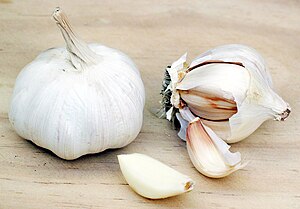
- Image via Wikipedia
We never had any garlic in the garden until last year. The year before last we were given some bulbs from a friend. He didn’t know what kind they were, but being Italian and a great chef, we took his word that it was some great garlic. He has since remarked that we’ll be mad at him this year because we’ll have garlic all over the garden. He’s not too far off the truth, either!
We planted in about 6 garlic bulbs in the Summer of 2008. Those bulbs matured and we harvested a few. The others were let go over the winter. In the late summer their seed heads fell over and planted many new garlic sets.
The garlic sprouts were thinned out and grew last summer and left to grow and overwinter. Now they’re growing again, and noticeably so! (Photo taken 29Mar2010.)

I’m looking forward to harvesting that garlic in the weeks ahead!
Related articles by Zemanta
- UAlbany scientists help solve garlic riddle (timesunion.com)
- The Art of Making Garlic Bread (cookingwithanne.blogspot.com)
![Reblog this post [with Zemanta]](http://img.zemanta.com/reblog_e.png?x-id=4857413c-a47c-4970-8f84-a420aeeb0715)